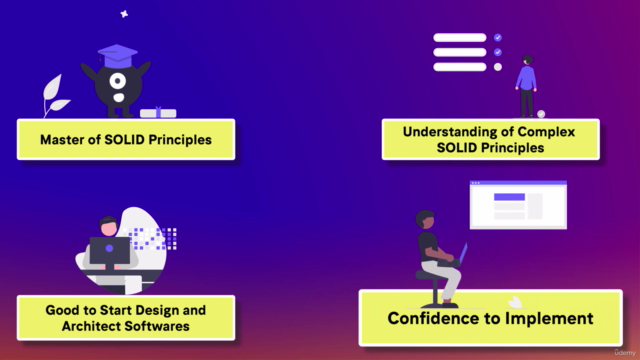Solid Principles for Clean Code Programming & Architecture

Why take this course?
🎓 Master SOLID Principles for Clean Code and Software Design Architecture
Course Overview:
Welcome to the comprehensive course on Solid Principles for Clean Code Programming & Architecture! This course is your gateway to mastering the SOLID principles of software design and architecture, tailored specifically for clean code in C#. Whether you're a beginner or an experienced developer, this course will equip you with the essential skills to build scalable, maintainable, and robust software.
What You'll Learn:
-
📚 Understanding SOLID Principles: Dive deep into the original principles introduced by Robert C. Martin in "Agile Software Development: Principles, Patterns, and Practices." These five principles—Single Responsibility Principle (SRP), Open-Closed Principle (OCP), Liskov Substitution Principle (LSP), Interface Segregation Principle (ISP), and Dependency Inversion Principle (DIP)—form the bedrock of modern software architecture.
-
🌍 Real-World Application: Learn how to apply these principles in C#, Java, and other object-oriented programming languages through practical examples and real-world case studies.
-
🔍 Importance of SOLID: Discover why the SOLID principles are critical for creating flexible, scalable, and clean code that stands the test of time.
-
🛠️ Step-by-Step Implementation: Follow a step-by-step guide on how to implement each SOLID principle in your real-life projects to ensure a clean, modular, and future-proof software architecture.
Topics Covered:
SOLID Principles Breakdown:
- Single Responsibility Principle (SRP): A class should have one, and only one, reason to change.
- Open-Closed Principle (OCP): Software entities should be open for extension, but closed for modification.
- Liskov Substitution Principle (LSP): Objects in a program should be replaceable with instances of their subtypes without altering the correctness of that program.
- Interface Segregation Principle (ISP): Clients should not be forced to depend upon interfaces they do not use.
- Dependency Inversion Principle (DIP): Dependence on abstractions, not on concretions.
Additional Concepts:
- Dependency Injection (DI) and Inversion of Control (IOC): Learn how to implement DI using IoC containers like Unity and understand the differences between DI, DIP, and IOC.
- Don't Repeat Yourself (DRY): Write code once and use it as needed to avoid redundancy and errors.
- Keep It Simple, Stupid (KISS): Simplify your code for ease of understanding and maintenance.
- General Responsibility Assignment Software Patterns (GRASP): Assign responsibilities in your code based on software principles that make it easier to manage change.
- You Aren’t Gonna Need It (YAGNI): Don't overdesign your system by adding functionality before it is required.
- Opportunity Cost Principle: Consider the potential lost revenue or costs when choosing one alternative over another.
- Big Design Up Front (BDUF) & Rough Design Up Front (RDUF): Plan and outline your design extensively before coding begins.
- Single Source of Truth: Establish a definitive source for information to avoid confusion and inconsistencies.
- Principle of Least Astonishment: Write code that behaves as users expect it to, minimizing surprises and confusion.
Hands-On Learning:
Engage with a real-world case study by building an Employee Management Portal from scratch. This practical exercise will demonstrate the application of SOLID principles in a complete software architecture, applicable across multiple languages like Java, JavaScript, Python, and more.
Outcomes:
By completing this course, you'll not only have a solid grasp of the SOLID principles but also be well-prepared for software development interview questions on these essential concepts. You'll be ready to write clean code and design robust architectures that adhere to these principles, making you a valuable asset in the world of software development.
Embark on your journey to becoming a master of SOLID principles with this comprehensive course. Enroll now and transform your coding practices! 🚀👨💻👩💻
Course Gallery




Loading charts...